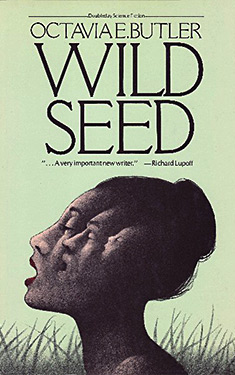Octavia
Butler
Completed 12/30/2018,
Reviewed 12/30/2018
4 stars
This is the
first book chronologically in the Patternist Series, although it was the third
written. It follows two immortals with
special powers who breed others like themselves. The relationship is less than healthy. It’s a fairly complex plot, but it’s very
intriguing and highly readable. The prose
is gorgeous and the character development is marvelous. I purchased this ebook and the rest of the
series from the Amazon deal of the day, so it was very inexpensive. I’ve been wanting to read more Octavia Butler
and this was the opportunity. So far, I
believe this was a wise purchase.
 Doro is an
immortal who has been around for about four thousand years. He does this by jumping from body to body,
effectively killing the person whose body he steals. He has been finding people with special gifts
like mind reading and psychokinetic power and breeding them with himself and intermarrying
their children. He calls the people who
have gifts but are not his progeny Wild Seeds.
Some of children grow into their gifts, some go insane. He is African, but has created a set of
communities in the New World in the 1600s, consisting mostly but not
exclusively of African people.
Doro is an
immortal who has been around for about four thousand years. He does this by jumping from body to body,
effectively killing the person whose body he steals. He has been finding people with special gifts
like mind reading and psychokinetic power and breeding them with himself and intermarrying
their children. He calls the people who
have gifts but are not his progeny Wild Seeds.
Some of children grow into their gifts, some go insane. He is African, but has created a set of
communities in the New World in the 1600s, consisting mostly but not
exclusively of African people.
Anyanwu has
been around for about two hundred years.
She is a shapeshifter, a healer, and has amazing strength. Some of her children have gifts, some don’t,
but none of them are immortal. She lives
a relatively simple life in Africa. Doro
finds her and proposes that they live together and have children to try to come
up with the perfect beings. He uses
force, telling her that if she doesn’t obey, he will kill her. That is how he controls all his wild seeds
and progeny. Anyanwu reluctantly agrees
and follows him to the New World. There,
they spend two hundred years in a constant battle of wits, with Doro building
his little empires and killing people because they outlasted their usefulness,
while Anyanwu resents Doro for his killing sprees and his control over
her.
The two main
characters are extremely well drawn, as are Isaac who is one of Doro’s sons,
and a slew of supporting characters.
Everyone felt very real; there were no cardboard characters. I really liked Isaac, who loved both Doro and
Anyanwu. He was the only person who
could criticize Doro without fear of death.
Doro is pretty loathsome.
Basically, he’s a narcissist who plays god. It is never made clear if he is a spirit or a
demon or something else. Anyanwu plays
antagonist to Doro. She is very
likeable, although I could not really identify with her. She never experiences any form of Stockholm Syndrome,
but since she agrees to be Doro’s wife, she tries to make the best of a bad situation.
There are
themes of gender, race, and slavery in this book. Since most of the book takes place in three
years, one each during the 17th, 18th, and 19th
centuries, slavery features heavily, though not necessarily in the classical
sense. Many of the wild seeds he chooses
from Africa are saved from the traditional slavery in the U.S. Doro can jump into the body of another man or
a woman, regardless of race. So some of
his children he bore, and some are white.
Anyanwu can change form into a man and can also be white or black. She can also change form into an animal.
The prose is
gorgeous. It is clear why Butler is
considered one of the greatest science fiction writers of her generation. She does really well choosing strong nouns
and verbs. She doesn’t get too flowery,
but she still builds excellent worlds. I
would compare her positively to Ursula Le Guin in this aspect. Specifically, this book is short, but it is
densely packed with simple description and dialogue. Even her long passages are wonderful and
fairly easy to read. I give this book
four stars out of five.
No comments:
Post a Comment